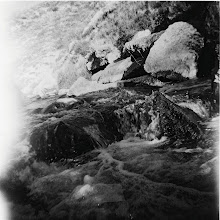Dreams are rarely clear and concise; more often they are foggy, unclear images, with brief moments of clarity. With the use of diction like “wake to sleep,” “those close beside me,” and “This shaking keeps me steady”(1,7,16) Roethke intertwines the two forms of dreaming. The effectiveness of these phrases is apparent. By using words and phrases that have multiple connotations it befuddles the reader, but also gives brief moments of clarity. This is important to the overall metaphor of the poem.
There are two words that really direct the purpose of the poem: waking and going. These words are transition words. With waking you are becoming aware, or growing in awareness. Going indicates that you are moving towards something. Clearly waking indicates the growing awareness of a goal and going indicates traveling upon the path towards that goal. These words are used over and over again. Almost as if the author keeps reiterating that dreams never stay the same; they are always in constant movement.
“Of those so close beside me, Which are you?”(7). The part of this line that catches my attention is the question, "Which are you?"(7). This clearly refers to another individual. To this point the voice of the poem is a soliloquy. This line is implemented for two purposes. When we dream we often fleet about: image to image. Rarely ever is there a conjunction between images. This line represents that jump. The other signifying factor in the line is the dependence of a goal on the world. As human beings we seek social acceptance. Usually our goals start out very personal and intimate. Eventually as they grow into a substantial entity, we can't keep them intimate. They bubble forth. This is when we seek the acceptance and support of those around us. It seems like every time somebody speaks of their goals, people respond in one of two ways: Face reality, you will never accomplish that. Or, that's so great, go get them, you can do anything. The question "Which are you?"(7) is asking whether the individual suddenly being addressed, as well as the audience, is a pessimist or optimist.
Death's metaphor awaits.“Great nature has another thing to do To me and you;” (13-14).This stanza reminds me that death is lurking. It is a natural part of life. It is an essential part of nature. “so take the lively air, And, lovely, learn by going where to go.”(15-16). Death is coming, it is the Great Nature's (13) plan for us. Live life while we have it. Don't wait to pursue your dreams. Go. Go now and live life. That is the purpose of this stanza. I heard once that all great poems either have the subject of death, or of love and life. Most of this poem is about life. In this one stanza the focus shifts. The shift is a warning. Dreams are meant for living. If we stagnate and don't dream we aren't really living. The author seems to say, death is on the way, so live your life ambitiously.
The first line in the last stanza is interesting. How can shaking keep someone steady? (16). My spirit is a wanderer. Complacency is my enemy. If life stagnates I get physically sick. The shaking, or change, in my life keeps me steady, keeps me healthy, keeps me interested. In many ways the whole purpose of a goal or a dream is to find change. By using the line "This shaking keeps me steady." Roethke is saying that the purpose of life is to have experiences. Throughout life we have experiences. Some are good some are bad. No matter how hard we try we will never be free from the consequences. But these consequences are the teaching principles in life. Without them there would be no growth. In order to achieve our goals, our dreams, we have to shake it up. We “learn by going where to go” (15).
“We think by feeling.” (4). This is true. Physically and metaphysically. The basic human has five senses: sight, hearing, touch, taste, and smell. These senses help us evaluate and learn from our surroundings. Without one of the five the way we evaluate life would drastically change. How do you feel? A common question. Let me think about it. A common answer. When I think about how I feel I close my eyes and focus. Somewhere deep inside of me the answer resides. I'm trying to pull it to the surface. A tingle in my toes, warmth from my bosom, an ache in my chest. Consider the entity that makes up you. Close your eyes, focus, and listen. Listen to the quivering molecules, listen to the humming of your spirit. This is you. “I hear my being dance from ear to ear.” (5). When we are happy and satisfied with life, our being dances a vibrant tune; a dance that eclipses our whole entity. When we dream we unleash our subconscious, we unleash ourselves. As I concentrate I align these feelings and to come to a conclusion; I am happy when I have a dream.
Roethke is a magician. Using everyday words he creates a piece of art that intertwines and explores an intense, complicated subject. Why is it important to dream and set goals? Because we learn from the adventure. "I learn by going where I have to go" (19). Without dreams, life is an empty shell. The metaphors, diction, and analogies Roethke uses truly delve into the depths of the human spirit. I congratulate him on an exquisite piece. And I find myself dreaming.
Citations:
Roethke, Theodore. "The Waking". Literature reading fiction, poetry, and drama. Robert DiYanni McGraw Hill 2007. 838-839. Print

No comments:
Post a Comment